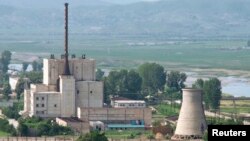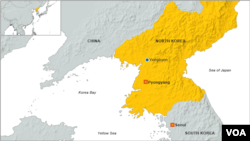SEOUL, SOUTH KOREA —
A U.S. institute says North Korea appears to be restarting its Yongbyon nuclear plant, citing satellite imagery last month showing white steam being vented from the newly reconstructed reactor. South Korean defense officials say the apparent resumption demonstrates Pyongyang continues to pursue nuclear weapons and must be stopped.
The U.S.-Korea Institute, at Johns Hopkins School of Advanced International Studies, said North Korea was likely restarting its Yongbyon nuclear reactor.
The institute circulated satellite images Thursday showing white steam venting from one of the plant's buildings in late August.
Analysts at the institute said the emissions indicated Pyongyang was restarting the reactor and it may soon be in full operation.
The nuclear plant uses steam produced by plutonium fuel rods to power turbines to create electricity.
Pyongyang has in the past processed the spent plutonium to create nuclear bombs that it has tested on three occasions, the most recent in February.
South Korea's Defense Ministry said restarting operations proved Pyongyang was not giving up its pursuit of nuclear weapons. Spokesman Kim Min-seok said the nuclear reactor must be stopped.
He said North Korea conducted nuclear tests three times and experts assessed that the test conducted this spring was quite successful. So if [North Korea] continued to operate the five megawatt reactor, then spent fuel would be produced and threats would be increased.
South Korea's Foreign Ministry spokesman, Cho Tai-young, said they couldn't confirm the reactor restart but were closely monitoring the situation.
He said they have seen the report and the government was paying close attention to the information related to North Korea and following up. "As we always tell you," he said, "sometimes it is not helpful to tell what we know. Therefore, we cannot confirm."
The possible reactor restart comes as relations on the Korean peninsula have been improving following months of tensions over North Korea’s third nuclear test and threats of nuclear attacks.
The two Koreas this week agreed to reopen the symbolically important Kaesong Industrial Complex.
The industrial park is the only North-South joint venture but has been closed since April when Pyongyang pulled its workers from the South Korean factories.
Pyongyang and Seoul also agreed, for the first time in years, to reopen tourism to a popular mountain resort and resume reunions between Korean families separated since the Korean War.
Koh Yu-hwan is a North Korea Studies professor at Dongguk University. He said Pyongyang was restarting the nuclear reactor not to upset improving relations with Seoul but as a negotiating tactic with the United States.
He said North Korea's declaration in April that it would re-open the Yongbyon nuclear reactor was a bargaining chip to pressure the U.S. For South Korea, he said, North Korea used the issue of Kaesong Industrial Complex as a bargaining chip. He said North Korea's talk about starting up the nuclear reactor was against the United States implying that it could increase their nuclear power.
North Korea built the Yongbyong reactor in the 1980s but agreed to shut it down under a 1994 agreement with the U.S. That deal broke down in 2002.
North Korea restarted the reactor and in 2006 tested its first nuclear device. The Yongybyon facility was disabled once again under a 2007 agreement with China, Japan, Russia, South Korea, and the United States.
Under the six-nation accord, North Korea in 2008 dramatically blew up the cooling tower at Yongbyon. But only months later, in response to sanctions over a rocket test, Pyongyang pulled out of the agreement, began processing nuclear fuel, and tested its second nuclear bomb.
In response to questions on the restarting of the plutonium reactor, China's Foreign Ministry Spokesman Hong Lei Thursday urged a return to six-nation talks.
He said they [Chinese authorities] were aware of the reports. The denuclearization of the Korean peninsula and its peace and stability, he said, has always been China's position and responds to the interests of all parties. He said it was necessary that all parties made an effort.
Beijing has been pushing for six-party-talks since Pyongyang in June said it was ready to talk with the grouping.
North Korea officially walked out of the negotiations in 2009. Washington, Seoul, and Tokyo said they would not resume the talks until Pyongyang showed sincerity to denuclearize.
Experts at the U.S.-Korea Institute said a functioning Yongbyon facility could eventually produce six kilograms of plutonium a year, enough to make two nuclear bombs.
North Korea is estimated to have collected enough plutonium to build as many as 12 bombs but is believed to be years away from being able to mount them onto missiles.
Seoul bureau Producer Youmi Kim contributed to this report.
The U.S.-Korea Institute, at Johns Hopkins School of Advanced International Studies, said North Korea was likely restarting its Yongbyon nuclear reactor.
The institute circulated satellite images Thursday showing white steam venting from one of the plant's buildings in late August.
Analysts at the institute said the emissions indicated Pyongyang was restarting the reactor and it may soon be in full operation.
The nuclear plant uses steam produced by plutonium fuel rods to power turbines to create electricity.
Pyongyang has in the past processed the spent plutonium to create nuclear bombs that it has tested on three occasions, the most recent in February.
South Korea's Defense Ministry said restarting operations proved Pyongyang was not giving up its pursuit of nuclear weapons. Spokesman Kim Min-seok said the nuclear reactor must be stopped.
He said North Korea conducted nuclear tests three times and experts assessed that the test conducted this spring was quite successful. So if [North Korea] continued to operate the five megawatt reactor, then spent fuel would be produced and threats would be increased.
South Korea's Foreign Ministry spokesman, Cho Tai-young, said they couldn't confirm the reactor restart but were closely monitoring the situation.
He said they have seen the report and the government was paying close attention to the information related to North Korea and following up. "As we always tell you," he said, "sometimes it is not helpful to tell what we know. Therefore, we cannot confirm."
The possible reactor restart comes as relations on the Korean peninsula have been improving following months of tensions over North Korea’s third nuclear test and threats of nuclear attacks.
The two Koreas this week agreed to reopen the symbolically important Kaesong Industrial Complex.
The industrial park is the only North-South joint venture but has been closed since April when Pyongyang pulled its workers from the South Korean factories.
Pyongyang and Seoul also agreed, for the first time in years, to reopen tourism to a popular mountain resort and resume reunions between Korean families separated since the Korean War.
Koh Yu-hwan is a North Korea Studies professor at Dongguk University. He said Pyongyang was restarting the nuclear reactor not to upset improving relations with Seoul but as a negotiating tactic with the United States.
He said North Korea's declaration in April that it would re-open the Yongbyon nuclear reactor was a bargaining chip to pressure the U.S. For South Korea, he said, North Korea used the issue of Kaesong Industrial Complex as a bargaining chip. He said North Korea's talk about starting up the nuclear reactor was against the United States implying that it could increase their nuclear power.
North Korea built the Yongbyong reactor in the 1980s but agreed to shut it down under a 1994 agreement with the U.S. That deal broke down in 2002.
North Korea restarted the reactor and in 2006 tested its first nuclear device. The Yongybyon facility was disabled once again under a 2007 agreement with China, Japan, Russia, South Korea, and the United States.
Under the six-nation accord, North Korea in 2008 dramatically blew up the cooling tower at Yongbyon. But only months later, in response to sanctions over a rocket test, Pyongyang pulled out of the agreement, began processing nuclear fuel, and tested its second nuclear bomb.
In response to questions on the restarting of the plutonium reactor, China's Foreign Ministry Spokesman Hong Lei Thursday urged a return to six-nation talks.
He said they [Chinese authorities] were aware of the reports. The denuclearization of the Korean peninsula and its peace and stability, he said, has always been China's position and responds to the interests of all parties. He said it was necessary that all parties made an effort.
Beijing has been pushing for six-party-talks since Pyongyang in June said it was ready to talk with the grouping.
North Korea officially walked out of the negotiations in 2009. Washington, Seoul, and Tokyo said they would not resume the talks until Pyongyang showed sincerity to denuclearize.
Experts at the U.S.-Korea Institute said a functioning Yongbyon facility could eventually produce six kilograms of plutonium a year, enough to make two nuclear bombs.
North Korea is estimated to have collected enough plutonium to build as many as 12 bombs but is believed to be years away from being able to mount them onto missiles.
Seoul bureau Producer Youmi Kim contributed to this report.








